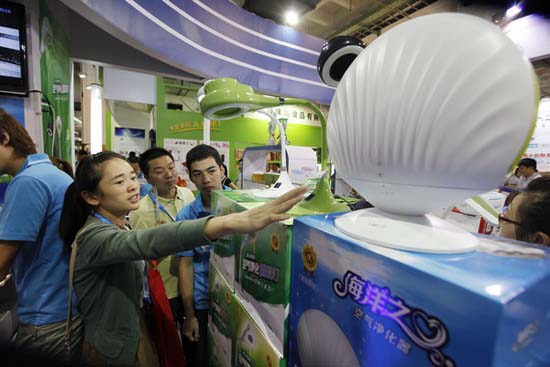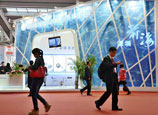
 |
| Air purifiers have recently been selling well in Beijing and other pollution-hit cities across China. (China Daily/A Jing) |
Monitoring network
Last year, the Chinese government started to monitor PM2.5. By December, the country had established a network of real-time monitors for PM2.5 intensity in 74 major cities nationwide.
"We are all amazed at how quickly China has implemented the PM2.5 monitoring network," said Pottberg.
She estimated that her company's business in China has increased by a factor of 10 since 1998, when the country started buying Met One's instruments, including monitors for BAM PM10, PM2.5 and PM1.
"Right now, China ranks among our top five global markets and we are hoping to continue doing business there for a long time, with all kinds of products," said Pottberg.
Automated Precision Inc, a leader in laser-based metrology products used in the aerospace, automotive and energy sectors, has the same high expectations.
"We have had a dramatic increase - more than 30 percent last year - in the number of Chinese customers from the clean-energy field," said Andrew Martel, marketing and communications manager at API.
The company entered the Chinese market in 2001. It now has nine offices or subsidiaries in different regions of China and its 20,000-square-meter factory in Chengdu, Sichuan province, employs more than 200 workers in R&D and manufacturing.
"Over the past decade, API has sold more than 1,000 instruments and accessories in China, totaling millions of dollars each year," said Martel.
API has also seen increased demand for its products and services from "green" energy companies. Martel considers China to be a market that will continue to grow in tandem with the increase in energy demand and consumption.
"Our technology is used in the assembly of many alternative-energy components, including wind turbines, solar panels and nuclear plant construction. However, that technology also allows auto and plane manufacturers to build more fuel-efficient vehicles," he said.
"We believe this will be increasingly important to these manufacturers and we expect strong demand for our technology from auto and aerospace companies for this purpose," he added.
But US businesses are not the only ones benefitting. A growing number of European clean-technology companies are eyeing opportunities in China as air pollution worsens as a result of rising coal consumption and an increase in vehicle exhaust emissions.
"The opportunities for low-emission technology in China are huge, and we can help Chinese companies with their technology," said Dave Shemmans, chief executive officer of Ricardo Plc, a British engineering consultancy.
Ricardo established a subsidiary in Shanghai eight years ago. Since then, it has helped a large number of Chinese companies develop energy-efficient, environmentally friendly products, particularly in the automotive industry.
"Our Chinese clients send their employees to our research and development center in the UK and they work with our staff to develop new technology. They can then take this technology back to China and teach their colleagues how to use it," said Shemmans.
Marco Warth, engineering director of the British company MAHLE Powertrain Ltd, also believes China's pollution problem provides opportunities for his company. "We can definitely help China improve air quality by helping automotive companies improve the energy-efficiency of their engines," he said.
In 2007, MAHLE Powertrain established a subsidiary in Shanghai and now helps many Chinese automotive companies design, develop and produce prototypes of high-efficiency, low-emission powertrains that comply with Euro 5 and 6 standards, so that they can export their products to Europe.
To take advantage of these opportunities, a delegation of clean-technology companies will visit China in March. The trip has been organized by UK Trade and Investment, a government agency.
Meanwhile, German clean-recently technology companies are also keenly scouting opportunities to help China address its pollution challenges, said Michael Schumann, head of German-Chinese Joint Initiatives at the Federal Association for Economic Development and Foreign Trade.
He said his team will place a special focus on introducing more German clean-technology innovations to China in 2013.
Marco Voigt, managing director of VKPartner, a German consultancy for the clean-technology industry, organized the IndustrialGreenTec Conference at the Hannover Messe technology fair in 2012. The one-day event allowed clean-technology companies to gather and discuss cooperation opportunities. The event proved so successful that Voigt said his team is planning to organize a similar conference in China.
Friedrich von Ploetz, managing director of Germany's SunCoal Industries GmbH, a company that helps customers turn organic waste to solid biofuel, sees opportunities in helping China replace fossil coal with biocoal.
"I understand that China's high level of CO2 emissions mostly come from coal-fired power plants. However, we've heard that in China agricultural straw is often burned too, causing environmental problems in agricultural areas. So, turning agricultural waste into biocoal to replace coal would solve both problems," he said.
Richard Gaul, a member of the supervisory board of Kolibri Power Systems AG, a German company that specializes in power-storage technology, sees great opportunities in China for renewable energy, which can be stored using the batteries that Kolibri is developing.
"The issue with renewable energies like wind and solar in comparison with fossil fuel technology is the uncertainty of power generation, but power-storage technology can help store energy for use when needed. Hence, our technology helps customers make the transition from fossil fuel energy to renewable energy," said Gaul.


















 China uses PM 2.5 in weather alert system
China uses PM 2.5 in weather alert system


![]()
